Nordstrom posts wider than expected loss but sales boosted by ‘occasion’ purchases
Nordstrom said sales jumped in the first quarter as the economy reopens and people dress up again, but the department store chain’s loss was larger than expected.
Net sales at the Seattle-based company rose 44 per cent from a year ago to $2.9bn. Online sales rose 23 per cent from a year ago and represented nearly half of all sales for the quarter.
Nordstrom said sales were boosted by improvements in categories like “occasion-based apparel, handbags, sunglasses and swimwear”.
Overall revenues of $3.01bn, topped expectations for $2.9bn, according to analysts polled by Refinitiv.
More shoppers have returned to stores, unleashing pent-up demand that has been fuelled by stimulus cheques and prompting rival department stores like Macy’s and Kohl’s to boost their sales outlooks. However, Nordstrom on Tuesday, reaffirmed its full-year outlook for revenues to grow more than 25 per cent.
Nordstrom joined other American companies warning of supply chain pressures. It said its selling, general and administrative expenses, as a percentage of net sales rose 280 basis points in the first quarter compared with the same quarter in fiscal 2019 as a result of “Covid-19 related labor and freight cost pressures”. The company’s SG&A costs were, however down from the year ago quarter, which included $250m in charges associated with the pandemic.
Nordstrom said it sped up vendor shipments to support sales trends and to “mitigate potential supply chain backlogs in the second quarter”.
The company’s first quarter net loss narrowed to $166m from $521m in the same period a year ago. That translated to a loss of $1.05 a share, compared with a loss of $3.33 a share in the year ago quarter and was worse than expectations for a loss of 57 cents a share.
Half of US adults now fully vaccinated
Half of US adults have now been fully vaccinated against Covid-19 within the first six months of the country’s vaccine rollout.
More than 129m Americans aged 18 and over are at least two weeks past their final vaccine dose, classifying them as fully vaccinated, according to data on Tuesday from the US Centers for Disease Control and Prevention.
Including those under the age of 18, 131m Americans, or 39.5 per cent of the total population, are now fully vaccinated.
The share of fully vaccinated residents is above 50 per cent in 23 states, with Vermont topping the list at 64.3 per cent, while Mississippi, at 34.8 per cent, is at the other end of the scale.
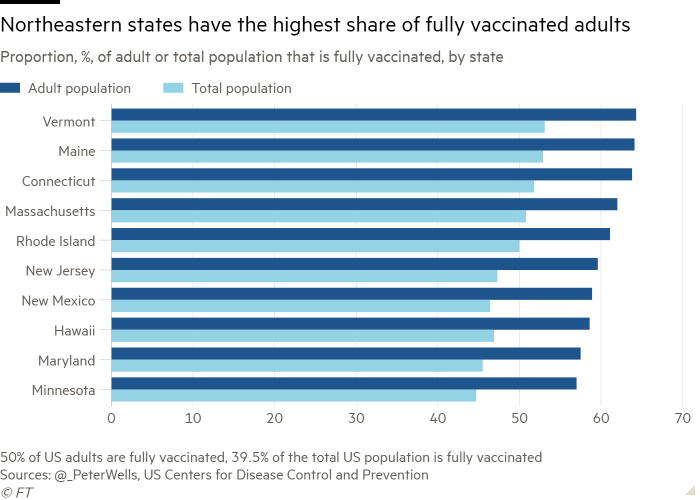
Almost 50 per cent of the US population has received at least one dose of a Covid-19 vaccine, while that share rises to 61.6 per cent for adults. President Joe Biden is aiming for 70 per cent of American adults to have received at least one jab by July 4.
While the rising share of fully vaccinated residents may have given the CDC some confidence in its recent decision to allow such individuals to forgo face masks in almost all indoor and outdoor settings, the pace of the vaccine rollout has slowed. An average of 1.65m doses were administered in the week ended May 20, according to CDC data on Tuesday, down from a peak rate of 3.31m on April 11.
The first American was inoculated on December 14, 2020.
Costa Rica becomes 38th country to join the OECD
In the midst of the Covid-19 pandemic, Costa Rica on Tuesday became the 38th member of the OECD, culminating an 11-year quest to join the club of developed nations.
“Once again, we show the world that Costa Rica strives for excellence and to conquer challenges regardless of how difficult they may seem, to achieve greater prosperity for its population,” President Carlos Alvarado said in a statement.
Costa Rica had begun addressing long overdue structural challenges to improve competition, fight corruption, strengthen the financial system and improve governance of state-owned enterprises as it sought OECD membership. These reforms also helped it clinch a $1.8m pandemic loan from the IMF last year.
The OECD accession comes as the tiny Central American country battles rising Covid cases, which now number some 305,000 with 3,849 deaths, according to the health ministry, and seeks congressional approval for a IMF-supported public employment reforms as a prelude to a disbursement of the loan.
Costa Rica joins Chile, Colombia and Mexico as OECD members from Latin America. Argentina, Brazil and Peru are being considered as prospective members.
‘Breakthrough’ Covid cases relatively rare in the US, says CDC report
More than 10,000 “breakthrough” cases of coronavirus in the US were reported to the country’s top public health agency by the end of April, at which time about 100m Americans had been fully vaccinated.
Between January 1 and April 30, 46 US states and territories had reported to the Centers for Disease Control and Prevention that a total of 10,262 individuals had tested positive for coronavirus despite being fully vaccinated, in what is known as a breakthrough infection.
The agency said in a report on Tuesday that 63 per cent of such cases occurred in females and that the median age of all patients was 58, which “reflects” the age and sex distribution of the fully vaccinated US population.
Of the reported breakthrough cases, 27 per cent of individuals were asymptomatic, 10 per cent were known to be hospitalised and 160 people, or 2 per cent, died. Among the 995 hospitalised patients, 289 were asymptomatic or admitted to hospital for a reason unrelated to coronavirus, the CDC said.
The median age of patients who died was 82, and 28 of these patients were asymptomatic or died from a cause unrelated to Covid-19.
Genomic sequencing data were available for 555, or 5 per cent, of all reported breakthrough infections during the January 1 to April 30 period and showed that 64 per cent of infections stemmed from so-called variants of concern. More than half of these cases were related to the strain of Covid-19 that was first identified in the UK last year and is now the predominant variant in the US.
The CDC said breakthrough cases are to be expected “especially before population immunity reaches sufficient levels to further decrease transmission” and that these occur in “only a small fraction” of all inoculated individuals, accounting for a “small percentage” of all Covid-19 cases.
As of April 30, about 101m Americans have been fully vaccinated, which is defined as two weeks since an individual has received their final jab. That total has risen to almost 131m, or 39.3 per cent of the US population, according to CDC data as of Monday morning.
The report’s findings were subject to at least two limitations, the CDC acknowledged. First, the number of reported breakthrough infections was probably a “substantial undercount” because the national surveillance system relies on passive and voluntary reporting — individuals who are asymptomatic or only have a mild illness may not seek testing. Second, genomic sequencing data are only available for a small proportion of reported Covid-19 cases.
OPINION: We can end the Covid pandemic in the next year
We are a strange species. We are able to produce marvels, but then fail to ensure they reach everybody who would benefit, even though the costs would be trivial against the gains to all. The marvel now is the swift arrival of effective vaccines against Covid-19. The failure is to ensure production and distribution at sufficient scale. In our folly, we are throwing away a glorious opportunity.
In “A Proposal to End the Covid-19 Pandemic”, Ruchir Agarwal and Gita Gopinath of the IMF have illuminated both the opportunity and the benefits from seizing it. Their suggested plan is to vaccinate at least 40 per cent of the population of all countries by the end of 2021 and at least 60 per cent by July 2022, as well as enabling widespread testing and tracing. The study estimates the cumulative economic benefits at $9tn ($1,150 per person) against a cost of $50bn — a ratio of 180 to one. This must be among the highest-return investments ever.
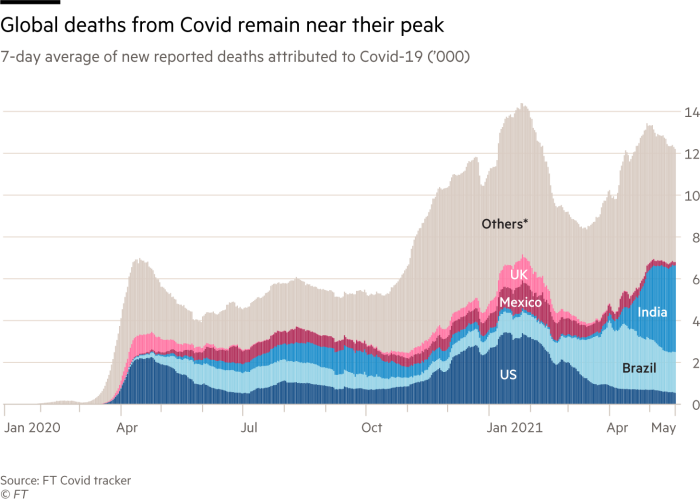
This pandemic is, above all, a health crisis. But it is also an economic disaster. The report is right to insist that “pandemic policy is also economic policy as there is no durable end to the economic crisis without an end to the health crisis.” A comparison of the IMF’s forecasts of October 2019 with those for April 2021 suggests that Covid-19 lowered global real output by $16tn (at 2019 prices) in 2020 and 2021 alone. If the pandemic continues, such losses will cumulate far into the future.
Read more here
US new build sales fell more than expected in April
Sales of newly built homes in the US fell more than expected last month, as rising prices and lack of supply took some momentum out of the housing market.
New residential sales, which account for about 10 per cent of the housing market, fell 5.9 per cent in April compared with March to an annualised rate of 863,000 units, the commerce department said on Tuesday. This missed economists’ expectations of 970,000 units.
The report also showed that March’s figures were revised lower to show a smaller 7.4 per cent increase to 917,000 units, compared with the initial estimate of 1.02m units.
“New home sales volume remains well above pre-pandemic levels, but it’s become very clear that the high and volatile price of lumber and other key building materials is introducing challenges to the new home building and sale process,” said Matthew Speakman, an economist at Zillow.
Housing demand has been strong during the pandemic as Americans took advantage of remote working, historically low mortgage rates and incomes supplemented by massive stimulus packages. However, a rise in lumber prices and a tight supply of homes along with strong demand has driven up home prices.
The commerce department report showed that at the current sales pace it would take just 4.4 months to deplete the current inventory of newly constructed homes in US. The median sales price rose 20.1 per cent from a year ago to $372,400.
Early on Tuesday, data showed the S&P Case-Shiller national home price index rose 13.2 per cent in March, the strongest annual gain since 2005.
“The surge in home prices will price some buyers out of the market and we expect a gradual easing in home price inflation in the second half of 2021,” said Nancy Vanden Houten, an economist at Oxford Economics.
Summer flight prices boost United Airlines
United Airlines said on Tuesday it would be profitable in the third quarter because of higher prices for domestic summer travel.
While business travel remains depressed, the Chicago company said in a filing that it expects domestic leisure yields for summer travel to exceed 2019 levels. Yield measures average ticket price for a given distance.
“As a result of these trends, the company now expects third quarter 2021 adjusted [earnings before interest, taxes, depreciation and amortisation] to be positive.”
United updated its guidance for the second quarter and said one of its revenue metrics would be better than expected. This is because, even though passenger numbers are lower than they were in 2019, on average prices are the same now as they were then.
The company said total revenue per available seat mile, an industry metric, would fall by only 12 per cent in the second quarter compared to 2019. Previously, it had forecast a 20 per cent drop.
During May, the yield on tickets overall reached 2019 levels for the same period, United said. For domestic tickets, it rose higher than in 2019.
United’s shares rose 5.5 per cent in early trading on Tuesday.
Siberian province makes vaccinations compulsory for some workers
A Siberian province will make vaccination against Covid-19 compulsory for some workers after several officials warned Russia’s nationwide uptake of vaccines was catastrophically slow.
Aisen Nikolaev, governor of the vast region of Yakutia in northeastern Siberia, said on Tuesday that employers were required to vaccinate all educational personnel, staff at children’s summer camps and workers in the event industry or face a Rbs200,000 fine.
The decree is the first sign Russia is considering compulsory nationwide vaccination after several officials publicly discussed the idea last week. Only 10m of the country’s 145m population are fully inoculated, with about 5m having taken the first dose of one of its two-dose jabs.
Officials have considered changing the vaccination strategy in recent weeks as infection rates rise. Some estimates expect Russia not to reach its target to vaccinate 60 per cent of the population by the autumn for several years.
Yakutia vaccinated 21,860 people last week despite having the capacity to administer jabs to 19,000 people a day, Nikolaev said, decrying the take-up as “extremely small.”
The situation in Yakutia remained “difficult,” he said, as infection rates, hospitalisations and deaths continued to rise, including in remote northern regions in the Arctic where no infections had previously been reported.
Russia declined to impose a second lockdown last autumn and has let bars and restaurants operate with minimal health restrictions. Entertainment venues continue to operate at reduced capacity.
Moderna vaccine safe and effective for children
Moderna will join the effort to vaccinate children against Covid-19 after a phase three trial showed its vaccine is safe and effective in under 18s.
The vaccine showed 100 per cent efficacy 14 days after the second shot in a phase three clinical trial of 3,732 adolescents aged 12 to 17 years old, the company said. The children were given 100mg doses, the same dose as the vaccine administered to adults, and experienced no significant safety issues.
The drugmaker plans to submit its data and request authorisation for the use of its mRNA vaccine from the US Food and Drug Administration and other regulators in early June.
Moderna becomes the second pharmaceutical company to seek authorisation for use of its Covid-19 vaccine in children after the US began to use the BioNTech/Pfizer jab this month.
A second vaccine effective in adolescents is likely to boost efforts to inoculate children before the start of the new school year and help countries reach herd immunity.
“We are encouraged that mRNA-1273 was highly effective at preventing Covid-19 in adolescents,” said Stéphane Bancel, chief executive of Moderna. “It is particularly exciting to see that the Moderna Covid-19 vaccine can prevent Sars-CoV-2 infection.”
European stocks surge as investors bet on Fed holding course
The dollar weakened against major currencies and European stocks hit record highs as traders bet on the US central bank looking through signs of rising inflation to keep interest rates close to zero.
The dollar index, which measures the greenback against a basket of trading partners’ currencies, lost 0.3 per cent on Tuesday to trade around its weakest level of 2021 so far. Over the past year, the index has fallen more than 10 per cent.
Sterling pushed 0.3 per cent higher against the dollar to $1.4191, near its strongest level since February. The euro also gained 0.3 per cent to $1.2259, its best level since January.
“The belief that US inflation is transitory has become an extremely consensus position,” said John Roe, head of multi-asset funds at Legal & General Investment Management.
In equity markets on Tuesday, Europe’s Stoxx 600 index rose 0.4 per cent, heading for a new all-time high. London’s FTSE 100 was flat, with the exporter-heavy index weighed down by sterling’s gains against the dollar. The Swiss Market index also rose 0.6 per cent to a new record.
Read more here.
Pandemic takes toll on self-employed, parents and less well off
The self-employed and those on the lowest incomes remain the hardest hit in Great Britain during the coronavirus pandemic, which has taken a toll on the mental wellbeing of the poorest.
The same groups whose finances were affected initially by the crisis remained worse off up to mid-April, the Office for National Statistics said on Tuesday. The self-employed were three times as likely to report reduced income than employees and twice as likely to use savings to cover living costs.
Those who earned the least — up to £10,000 a year — were more likely to say the pandemic had hurt their wellbeing in comparison with those in a higher pay bracket. Eighteen per cent said the pandemic had worsened their mental health while about a third felt stressed or anxious.
Employed parents were less likely to be furloughed since the beginning of this year, unlike in the first phase of lockdown, the ONS report for May showed. Nonetheless they were likelier to report reduced income than those with no children.
Meanwhile, the number of single-site businesses trading rose throughout the UK from late March to early May as coronavirus restrictions were eased, a separate ONS report stated on Tuesday. Wales reported 87 per cent of such businesses were trading, the highest percentage of the four devolved nations.
Boom in self-storage as UK homeworkers declutter
Self-storage usage has reached record levels in the UK, following an increase in house moves and a shift to homeworking during the pandemic.
According to a new report from Cushman & Wakefield and the Self Storage Association UK, occupancy of lettable self-storage space has risen from 76 per cent to 82 per cent.
The report said that the change in working habits was behind the increase, with customers rearranging their living spaces to accommodate the shift to homeworking.
House moves also played a large role in the growth in occupancy, and there was a significant uptick in retail businesses using self-storage space in 2020.
Revenues of self-storage operators rose 16 per cent to £890m last year.
“Self storage is one of the few sectors to have flourished over the past 12 months and in turn we have witnessed a significant increase in demand from investors, in particular from new money,” said Philip Macauley, head of self-storage at Cushman & Wakefield.
UK exports to Ireland dive more than to any other top partner
UK exports to Ireland nearly halved in January and dropped sharply in the first quarter, reflecting the impact of the coronavirus pandemic, the trading challenges at the end of the EU transition period and stockpiling activity last year.
Exports of goods to Ireland fell 47.3 per cent between December and January, the greatest percentage fall of any top exporting partner during this period, data published on Tuesday from the Office for National Statistics showed.
However, the statistics office stated that, with one-quarter of the data available, it is too early to assess the extent to which this reflects short-term trade disruption or longer term supply chain adjustments as the pandemic maintains its grip.
The UK trade with Ireland recovered somewhat in February and March, but it was still 30 per cent down in the first quarter compared with the previous three months. This was a much larger contraction than the 18 per cent recorded across the EU countries.
Chemicals, food and live animals showed the largest decreases in exports to Ireland in January as products faced extra checks when moving from Great Britain to Ireland.
These checks, as part of the Northern Ireland Protocol, have caused delays at the Great Britain and Northern Ireland border, the ONS said.
About 38 per cent of exporting businesses have reported additional paperwork as a challenge to exporting since February, a proportion that has remained stable through to last month.
The ONS reported that exports of food and live animals to Ireland faced the greatest number of added checks. This includes the introduction of export health certificates for animal products moving between Great Britain and Ireland.
Rules of origin stipulations in the EU-UK Trade Cooperation Agreement, which requires that all goods must be able to demonstrate that they “originate” in the EU or the UK to qualify for zero tariff treatment, might have led to additional costs.
However, the fall in the first quarter was made more dramatic by stockpiling activity in the last quarter of 2020, which boosted trade between the UK and Ireland in anticipation of the changing rules.
The ONS reported declining trade with Germany, the UK’s largest EU trading partner. Since April 2019, there has been a decline in imports from Germany, “which coincides with increased uncertainty around previous EU exit dates”, stated the ONS. From the second quarter last year, the UK has imported more from China than it has from Germany.
Germany set for rebound as business confidence hits 2-year high
German business confidence has hit a fresh two-year high, according to a closely watched survey, as falling coronavirus infections and the easing of containment measures buoyed hopes that Europe’s largest economy is on track for a strong rebound.
The Ifo Institute in Munich said its business climate indicator, based on a monthly survey of about 9,000 German companies, had increased by 2.6 points to 99.2, outstripping most economists’ expectations to reach its highest level since May 2019.
The survey was published shortly after the federal statistical office said Germany’s economy shrank 1.8 per cent in the first quarter, a slight downward revision from its initial estimate that left gross domestic product 5 per cent below pre-pandemic levels.
But economists are confident that Europe’s largest economy will return to growth in the second quarter, boosted by an accelerating vaccination programme, a steady lifting of lockdown measures and booming export orders for manufacturers.
“Companies were more satisfied with their current business situation,” said Clemens Fuest, president of Ifo. “They are also more optimistic regarding the coming months. The German economy is picking up speed.”
Ifo said confidence increased across all sectors. However, in a sign of rising inflationary pressures, it added that manufacturers expected prices as well as order books to keep climbing, while “material shortages became an even more pressing concern” for the construction sector.
German household spending fell 5.4 per cent in the first quarter. But economists expect a burst of pent-up spending now that most non-essential stores in the country have been allowed to reopen, while in many regions restaurants and bars have started offering outside dining.
Coronavirus-related deaths tick up in England
Deaths involving Covid-19 rose across England in the second week of May, though the Office for National Statistics said the recent bank holiday made it difficult to interpret trends.
Figures released on Tuesday showed there were 145 deaths in England mentioning coronavirus on the death certificate, whether as an underlying cause or not, in the seven days to May 14. That was up from 124 the week before.
The Covid-related deaths accounted for 1.5 per cent of those recorded across the country, the ONS said. The total figure of 9,512 deaths during the week was 6.4 per cent above the five-year average.
Five Covid-related deaths were recorded in Wales in the week to May 14, down from 6 in the first week of the month. A total of 640 people died across Wales, up 80 on the previous week and 4.6 per cent more than the five-year average.
The ONS said that week-on-week comparisons were complicated by the bank holiday on May 2, when register offices were likely to be closed. Comparisons with the five-year average should also be “interpreted with caution”, it said, as the bank holiday falls on different weeks in different years.
UK minister defends latest guidelines to avoid Covid hotspots
UK work and pensions secretary Therese Coffey defended the latest guidelines to avoid travel to parts of England that are battling the strain of coronavirus that was first discovered in India, following criticism over a lack of consultation.
The guidance, which was published on Friday, advises the public should not go to areas that include Blackburn, Hounslow and North Tyneside. It suggests people in those areas should meet outdoors rather than indoors, and to socially distance when encountering people they do not live with.
“I’m surprised to hear that people think this has come out of the blue — it hasn’t,” said Coffey in an interview with Sky News on Tuesday. “It’s about formalising, on the record, the guidance which we believe people can and should follow,” she added.
However, the advice has drawn criticism from local leaders.
Dominic Harrison, director of public health at Blackburn and Darwen Council, said the communities affected “were not consulted with, warned of, notified about, or alerted to this guidance”.
“I have asked to see the national risk assessment which supports this action — it has not been provided to us yet,” he added via a tweet on Tuesday.
Taiwan extends lockdown measures as Covid outbreak spreads
Taiwan on Tuesday extended strict social distancing and contact tracing measures by three weeks as the country’s first significant outbreak of Covid-19 continues to spread.
Schools will remain closed, with indoor meetings limited to 5 people and outdoor gatherings to 10 until June 14, the Central Epidemic Command Centre said. Anyone visiting shops or offices must register their contact information to enhance contact tracing.
The extension of the measures came as health authorities announced 281 new locally transmitted cases on top of 261 cases from a testing backlog over the past week.
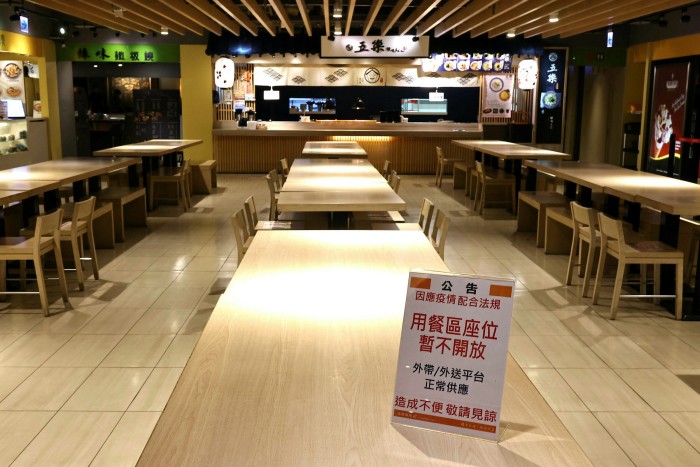
Authorities have reported more than 3,800 local infections since a community outbreak was discovered a fortnight ago. The death toll has risen from seven to 35.
Health minister Chen Shih-chung said that daily new infections had been gradually trending down since a peak on May 17, meaning restrictions were having an effect.
But he added that the positive case rate among those tested remained too high, indicating there were more hidden infections in the community.
Taiwan has been caught off guard by the recent wave of local infections: just over 1 per cent of the population have been inoculated, with the country having received 700,000 doses of vaccines in total.
On Tuesday, the Central Epidemic Command Centre said 2m doses ordered from abroad were expected to arrive in June and that 10m doses would be available before the end of August.
Sandwich maker Greencore hit as consumers turn away from convenience foods
The UK’s largest sandwich maker Greencore reported a 19 per cent decline in six-month sales as coronavirus restrictions ate into consumers’ appetite for convenience foods.
Revenues were £577.1m for the six months to March, with group operating profit down 89 per cent from a year earlier to £3.9m.
But the group said sales in food-to-go categories had been running at about 14 per cent below pre-Covid levels since the start of April, as loosening restrictions helped sales of sandwiches, salads and sushi to begin recovering.
“This has been a challenging period for Greencore, but the consistent build in our revenues since early March as lockdown measures have eased and Covid-19 cases have fallen give us real cause for optimism,” Patrick Coveney, chief executive, said.
“We are confident of being able to build back the business rapidly and profitably, and are optimistic about the medium-term prospects for Greencore.”
Dublin-based Greencore suspended its dividend last year, put in place cost-cutting measures and held a £87m equity placing in November to help deal with the impact of the pandemic.
The group, which makes chilled ready meals, soups and sauces, quiche, pickles and frozen Yorkshire puddings, said that adjusted operating profit for the current financial year would come in ahead of last year if the UK government kept to its schedule out of lockdown.
Wagamama owner The Restaurant Group boosted by lockdown easing
Wagamama owner The Restaurant Group said it was “very encouraged” by a recovery of sales at its eateries and pubs across the UK following the easing of coronavirus lockdown rules, with business approaching pre-pandemic levels.
Figures on Tuesday showed footfall at its pubs and Wagamama sites reached 85 per cent of comparable 2019 figures in the five weeks to May 16, the day before inside dining was reintroduced across much of England. Customers have been allowed to eat outside at restaurants and cafes in England since April 12.
Food to go is also in demand. Average delivery and takeaway sales at its Wagamama and leisure chains were 3 times and 5.5 times higher than pre-Covid levels respectively in the six weeks to April 11, the company said.
Trading was also strong in Scotland, where indoor dining returned late last month. Business at the group’s 23 sites open across the country returned to more than 20 per cent of 2019 levels in the 3 weeks to May 16.
The Restaurant Group, whose brands include Frankie & Benny’s and Garfunkel’s, has reopened 350 of its sites across the UK.
The casual dining company said it was well positioned to benefit from a further easing of lockdown restrictions scheduled for June, although it cautioned the environment for the rest of the year remained uncertain.
No meaningful like-for-like sales comparisons could be made for the financial year to date, the Restaurant Group said, citing “significant disruption” to its ability to trade over the winter period.
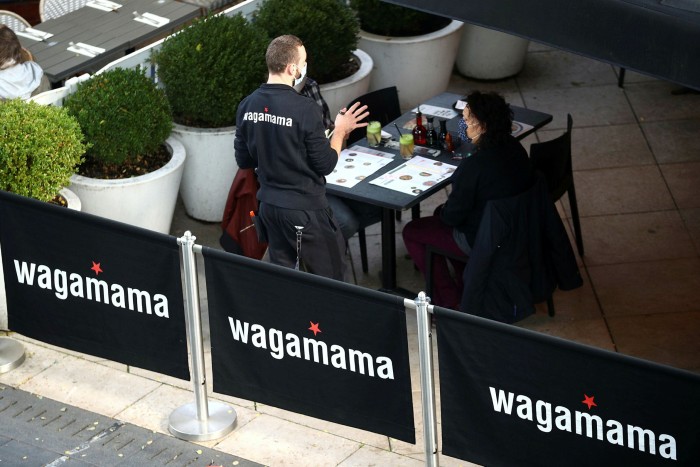
West End landlord Shaftesbury posts loss but area shows signs of recovery
West End landlord Shaftesbury has posted a £338.5m loss before tax, largely thanks to a 10 per cent fall in the valuation of its portfolio to £2.8bn, despite signs of life returning to the London district.
After a bruising 15 months that kept visitors from the area and sent the number of empty shop fronts spiralling, the loosening of restrictions on April 12 encouraged some businesses to return and others to hunt new space, according to the company.
Vacancy rates have fallen from 11.9 per cent to 11.3 per cent since March 31 while the amount of space under offer edged up in the same period.
The area’s recovery remains in the balance, however. Over the six months to the end of March, Shaftesbury collected 43 per cent of the rent it was due from tenants, many of which have been forced to close for the bulk of that time.
Vacancy rates in the central London district have surged during the coronavirus pandemic with shops and restaurants cutting leases they cannot afford. The number of empty units in Chinatown and Soho landlord Shaftesbury’s estate has more than trebled during coronavirus.
Shaftesbury admitted that the pace and shape of any recovery would be determined by factors beyond its control: the effectiveness of the vaccine drive, emergence of new strains of the virus and the return of international tourists.
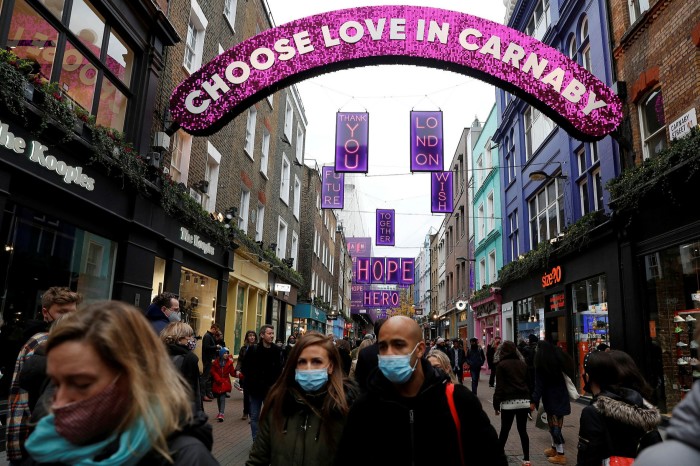
Covid response keeps UK government borrowing at near record levels
The UK government borrowed a near record amount in April as the coronavirus crisis pushed up public spending and limited tax receipts.
Public sector net borrowing, excluding public sector banks, was estimated at a more than expected £31.7bn in April, data from the Office for National Statistics showed on Tuesday.
The figure, the first for the 2021/2022 fiscal year, was the second highest April borrowing since monthly records began in 1993, but was £15.6bn less than in April 2020. It was also higher than the £30.9bn forecast by economists polled by Reuters.
Public borrowing for the fiscal year ending March 2021 was revised down by £2.8bn, but remained the highest since the second world war, laying bare the cost of the large government support to the economy.
The ONS revealed that central government bodies spent an estimated £96bn on day-to-day activities last month. That included spending on the furlough scheme that still protects millions of jobs.
Bahrain urges booster shots after record deaths
Bahrain’s health ministry on Tuesday urged residents to register for Covid-19 booster vaccines, a day after the Gulf kingdom recorded its highest number of deaths in a 24-hour period.
Last week, Bahrain restricted access to most public venues to immunised people after the surge in infections, which authorities blamed on gatherings during the Muslim fasting month of Ramadan.
Bahrain, an island of 1.7m people, on Monday reported about 2,800 new Covid-19 infections, bringing the case tally since the pandemic began to more than 220,000. More than 800 people have died.
“Vaccinations are our best protection against Covid-19, in reducing infection rates and reducing the severity of symptoms and complications that may lead to death,” the ministry said in a statement.
The unvaccinated accounted for 95 per cent of deaths, it added.
Since May 18, Bahrain has offered booster shots of the Chinese-made Sinopharm vaccine to residents over the age of 50, to be administered six months after the initial vaccination.
Salthill fund suffers losses in biotech missteps
A biotechnology-focused hedge fund run by $1tn investment giant Wellington Management has been left nursing double-digit losses since the start of last year, even as the pandemic has sent the price of the biotechnology stocks it trades soaring.
Boston-based Wellington suffered a loss of about 11.6 per cent in its Salthill Partners hedge fund from the end of 2019 until the end of last month, according to investor documents seen by the Financial Times. Over the same period the Nasdaq Biotech index has risen 28.5 per cent.
Salthill’s loss shows that some funds have struggled to profit from the biotech sector even though stocks with higher growth prospects have rallied sharply and biotech has received a fillip from positive news on coronavirus vaccines.
Read more here
New Zealand pauses ‘travel bubble’ with Victoria
New Zealand’s “travel bubble” with the Australian state of Victoria will be paused from Tuesday while the source of infection of five Covid-19 cases reported in Melbourne is investigated.
Victoria has put in place restrictions which come into force tonight, limiting the size of gatherings and requiring the use of face coverings indoors, following confirmation of a fifth locally-acquired case of Covid-19 in the past 48 hours.
“The pause will come into force from 7.59pm New Zealand time and be in place for 72 hours initially,” said Chris Hipkins, the New Zealand minister responsible for the country’s Covid-19 response strategy. “As with previous pauses, it will be under constant review.”
He said the decision to pause travel was “the most cautious option” pending the resolution of “several unknowns” with the Victoria outbreak.
Hipkins said Australian health authorities had yet to find an epidemiological link for the new cases, who are all close family members spread across three households in Whittlesea, a suburb in Melbourne’s outer north.
Home is main transmission route, study finds
A Hong Kong study has found that children are far more likely to be infected with coronavirus at home than at school, as researchers warned of adverse effects on children due to prolonged absences from in-person classes.
The University of Hong Kong team showed evidence that the risk of children contracting Covid-19 at school is relatively low.
In the largest paediatric study of its kind in Hong Kong, 397 children and adolescents infected with Covid-19 in the first three waves of outbreaks were surveyed.
HKU Faculty of Medicine researchers found that 183 out of 186 cases domestically infected with identifiable sources had family members living in the same household who also became infected with Covid-19.
The three other infected individuals were reportedly schoolmates who had close contact with each other.
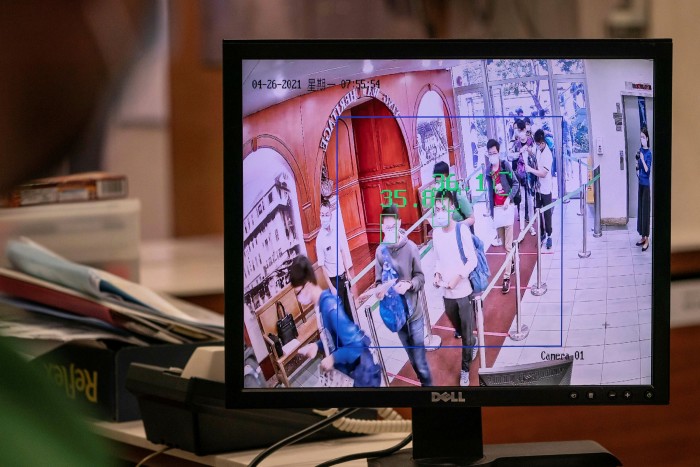
“Survey results clearly showed that close contact with their parents and grandparents was the primary route through which Hong Kong children and adolescents got infected with Covid-19, indicating an urgent need for eligible adults to get vaccinated,” said Patrick Ip, clinical associate professor at the faculty’s department of paediatrics and adolescent medicine.
In another survey of 29,202 Hong Kong families with children aged two to 12 years, researchers found that even children without Covid-19 infections are prone to an array of psychosocial problems during the pandemic.
Children were shown to have hyperactivity symptom scores 7.5 per cent higher during coronavirus-related school closures than before the pandemic.
“It is evident that children’s psychosocial well-being has been adversely affected by extended school closure during the pandemic,” said Mike Kwan, honorary clinical associate professor.
Infrastructure boom behind KKR’s Laing bid
As political leaders boost infrastructure spending following the Covid-19 crisis, a growing number of deep-pocketed financial investors are sensing an opportunity.
One of them is KKR, the US buyout group with $252bn in assets under management, which swooped on UK-based John Laing in an agreed £2bn takeover bid.
With the big funding pools of its soon-to-be New York parent potentially at its disposal, the deal could transform the FTSE 250-listed group, one of London’s best-known infrastructure investors.
Read more here
Airline sets emission goals despite Covid-19 hit
Singapore Airlines Group on Monday said it would set a goal to achieve net zero carbon emissions by 2050, despite the battering the company’s carriers have received from the coronavirus pandemic.
The group, known as SIA, said Singapore Airlines, budget brand Scoot and SIA Cargo would invest in more efficient aircraft, adopt low-carbon technology in aviation fuels and seek carbon offsets.
“SIA Group has pursued multiple projects in support of its sustainability goals even amidst the Covid-19 pandemic,” the company said in a statement.
SIA completed the installation of solar panels on all of its office buildings in Singapore, providing 18 per cent of its electricity demand.
It uses sustainable paper packaging and bamboo cutlery on some regional flights, reducing the amount of single-use plastics.
The group is raising S$6.2bn (US$4.6bn) via mandatory convertible bonds after reporting S$4.3bn in net losses in the financial year ended March 31, the “toughest … in its history”.
SIA reported losses of just S$212m last year.
The group expects passenger capacity to grow to about 32 per cent of pre-pandemic levels by July.
But while “mass vaccination exercises are in progress in most of our major markets, the prognosis for the global airline industry remains uncertain”, SIA said in a statement last week.
UK hospitality rush points to economic boost
Consumers braved some of the worst May weather on record last week to make the most of the great indoor reopening of British pubs and restaurants, suggesting a sustained uplift in spending could help the UK’s economy recover quicker than expected.
An analysis of non-official data shows that after months of lockdown, the populations of England, Scotland and Wales flocked back to their favourite bars and eateries as they opened inside from May 17, boosting bookings and sales to above pre-pandemic levels.
The figures showed a quicker rebound than after the reopening following the first lockdown last year. The latest stage in the easing of coronavirus restrictions also helped lift the tourism sector.
Read more here
Greece opens jabs to 35- to 39-year olds
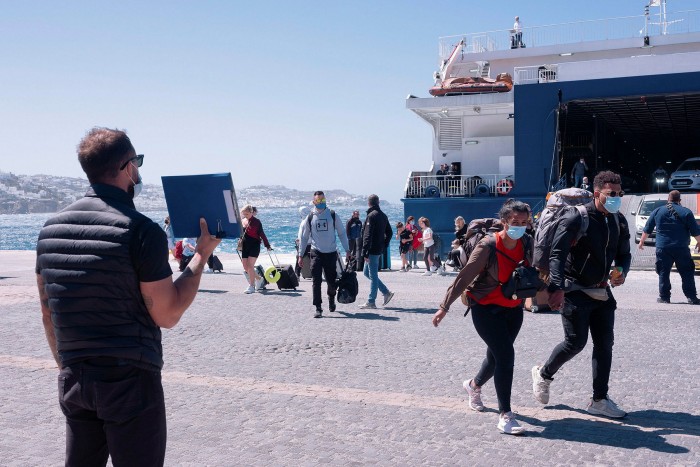
Greek residents aged 35-39 will be able to receive a coronavirus inoculation from Wednesday, officials said, with all four vaccines in the country available to them.
The 40-44 age group was the first to be administered with all types of vaccines from May 21, said Marios Themistocleous, health ministry secretary-general.
Greece offers the Oxford/AstraZeneca, Moderna, BioNTech/Pfizer and Johnson & Johnson/Janssen jabs.
Themistocleous said Greece passed 5m inoculations on Monday, with 1.8m of Greece’s 10.7m people fully vaccinated.
National Vaccination Committee director Maria Theodoridou said on Monday that people who have recovered from Covid-19 should be vaccinated between 6 and 12 months after onset of the disease.
Washington to probe post-jab heart issues
Health authorities in Washington state said on Monday they would investigate cases of myocarditis or pericarditis — inflammation or irritation of heart tissue — that were reported after Covid-19 vaccinations.
“Further investigation is needed to determine if these cases are connected in any way to Covid-19 vaccines,” the state health department said in a statement.
Myocarditis, inflammation of the heart tissue, is usually caused by a viral infection. Symptoms include chest pain, abnormal heartbeat, and shortness of breath, the department said.
Pericarditis is swelling and irritation of the thin sac surrounding the heart.
The department said it would be working with the US Centers for Disease Control and Prevention to gather data and other information about these incidents.
Health care providers in Washington, Idaho and Oregon have been notified about this issue, it added.
Last week, the CDC’s Advisory Committee on Immunisation Practices reported “relatively few reports of myocarditis”, following vaccination, mainly in young adults and adolescents.
The group did not specify a particular vaccine, though the Pfizer/BioNTech jab is the only one authorised for use in children between the ages of 12 and 17.
Macron weighs economics versus politics
As French bars and restaurants reopened last week, Emmanuel Macron’s government steeled for a big moment: how to wean the pandemic-battered economy off life support and nurse it back to health.
When the pandemic began, the president promised to do “whatever it takes” to support businesses and workers with an array of programmes, such as furloughs, loans and cash support.
But now, as emergency aid begins to be scaled back, Macron, who is running for re-election in April next year, must show voters that he can put the French economy back on track. Already prominent economists and political opponents such as Marine Le Pen are urging the government to think bigger in terms of stimulus.
Read more here
Melbourne reintroduces distancing after outbreak
Authorities have reintroduced social distancing restrictions in Melbourne following the detection of a cluster of five Covid-19 cases in Australia’s second-largest city over the past 24 hours.
From 6pm on Tuesday everyone 12 years of age or older will have to wear masks when indoors and private gatherings at people’s homes will be limited to five visitors.
Public gatherings are limited to 30 people under the new restrictions, which follow an outbreak that broke a 86-day run without an infection outside of hotel quarantine.
On Tuesday morning authorities in the state of Victoria said a man in his 60s returned a positive Covid-19 test, which brings to five the number of cases identified in the northern suburbs of Melbourne.
South Australia has introduced border restrictions for people who attended any of the exposure sites listed by Victorian authorities.
The latest cluster of cases in Melbourne threatens to derail one of the world’s most successful efforts to suppress coronavirus, with just a few cases reported outside hotel quarantine in recent months.
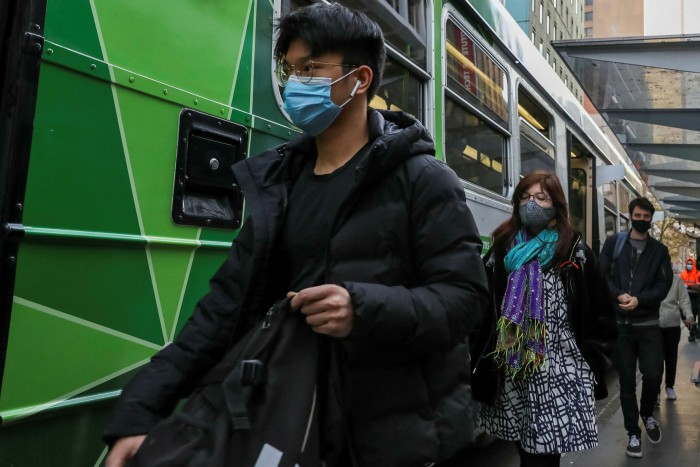
“These cases are an important reminder that until the majority of Australians have been vaccinated, and as we move into winter, we cannot let any complacency creep in,” James Merlino, Victoria’s acting premier, said.
Last year, Melbourne imposed one of the world’s toughest lockdowns lasting 112 days to quash local transmission of the virus.
The outbreak comes as Australia’s vaccination campaign continues to lag behind the US and most EU countries, due to delays in obtaining vaccines and bureaucratic errors.
Recent surveys have also highlighted vaccine hesitancy among the public, which experts say is linked to reports of blood clot complications regarding AstraZeneca’s vaccine and complacency due to the nation’s success in suppressing Covid-19.
Paul Kelly, Australia’s chief medical officer, has written to doctors to reassure them of the safety and efficacy of the AstraZeneca vaccine, which the government has approved for people over the age of 50. People under 50 in Australia receive BioNTech/Pfizer jabs.
“It’s about protecting your own health, not sitting there waiting for an outbreak,” Kelly said. “The more we can get vaccinated now, the better situation we’ll be in.
Asia’s curious struggle to vaccinate its citizens
Asian countries that led the way in controlling Covid-19 last year have become laggards in the battle against the virus as their efforts to vaccinate their populations fall behind other parts of the world.
The problems with rollout vary from country to country, but across most of Asia one factor is constant: a lack of vaccines to administer. Having failed to develop or produce vaccines at home, many Asian countries must wait for deliveries from Europe or the US, leaving them at the back of the queue.
While Asia has become the factory of the world, making up an increasingly dominant share of the global economy, the race for vaccines has shown it still lags behind in pharmaceuticals.
Read more here
Focus on seven regions, experts tell Manila
A Philippines expert health panel on Monday recommended that the government prioritise the vaccination of half of the population in greater Manila and six other areas to achieve containment of the coronavirus pandemic.
The seven high-risk areas — the National Capital Region, Baguio City, Cebu City, Tuguegarao City in Cagayan province, Santiago City in Isabela, Cainta in Rizal and Imus in Cavite — are home to nearly 16m people.
“In many countries that have vaccinated 50 per cent of the population, there has been an immediate impact on containment of Covid-19. This is the immediate target in high-risk areas,” the University of the Philippines-OCTA Research Group said in its monitoring report.
In a separate development, the Philippine ambassador to Washington said on Monday he expected about 4m doses of vaccine to be donated by the US.
Jose Manuel Romualdez said after talks at the White House that he expected 2m doses through the multilateral Covax facility and another 2m from Pfizer.
Hong Kong in talks to restart some cruises
Hong Kong travel companies could soon offer “cruises to nowhere” to residents, most of whom have been stuck in the territory for more than a year due to border closures.
The government said cruises would be approved for restart only if crew and passengers are fully vaccinated and there is no destination port outside Hong Kong.
“I think the public or the operators will be exceptionally cautious in resuming any form of cruise travel,” Edward Yau, Hong Kong commerce secretary, said on Monday.
He said the government is in negotiations with cruise operators, and asked: “If sufficient precautions are being taken, if crew members fulfil all the quarantine, testing, as well as vaccination requirements, would it be a safe start for a selected few to have these limited short cruises?”
Yuen Chun-ning, chief executive of the WWPKG travel agency, told RTHK that as well as vaccinations, people joining cruises would also need to provide proof that they had tested negative for Covid-19 in the previous 72 hours.
“Four-day or three-day tours would be provided for about HK$1,000 (US$128) per day,” he told the Hong Kong broadcaster.
Ecuador’s new president strikes sombre note
Conservative businessman Guillermo Lasso was sworn in as Ecuador’s new president on Monday, delivering a sombre speech to congress about the massive economic and social challenges his government faces.
The 65-year-old, who surprised everyone by winning last month’s election, said Ecuador’s previous leaders had failed the country by giving in to the temptation of authoritarianism and “the obscene cult of the caudillo” — the strongman who has so often dominated Latin American politics.
“Today, we’re receiving a country with historic levels of unemployment, a country that has stood out for its inability to deal with a brutal pandemic,” he told visiting dignitaries, including Brazil’s president Jair Bolsonaro and Felipe VI, king of Spain.
Read more here
Taiwan reports another 300-plus cases
Taiwan on Monday reported another 339 Covid-19 cases — all but five locally transmitted — and added another 256 cases to its controversial retroactive list.
The Central Epidemic Command Center also announced six deaths. Two women and four men between 60 and 79 years old were the latest fatalities, bringing the national total to 29.
The retroactive cases now total nearly 1,000 in what has prompted attacks on the government from the opposition Kuomintang, who accused authorities of mismanagement.
Chen Shih-chung, health minister, said the extra cases had not been included in previous reports due to a technical delay.
But Kuomintang leader Johnny Chiang said on Sunday that the news of the extra cases “freaks everyone out” and casts doubt over the accuracy of health ministry data.
Japan launches mass vaccination campaign
Japan on Monday launched a mass vaccination campaign in Tokyo and Osaka just two months before the Olympic Games are scheduled to begin.
Yoshihide Suga, prime minister, visited the Tokyo site, saying he hoped the rollout of jabs would enable people “regain their peace of mind as soon as possible”.
He said the inoculated elderly people he spoke to at the vaccination centre seemed “relieved”, according to a statement on the prime minister’s official website.
Japan’s armed forces are running the sites. Military doctors and nurses are using the US-developed Moderna vaccine. Japan has also approved the Pfizer/BioNTech vaccine.
Officials said the sites would be open every day for three months from morning to late evening.
Suga said it was regrettable a top government adviser quit his post Monday following a backlash over playing down the pandemic.
Kaetsu University professor Yoichi Takahashi wrote on Twitter that the number of coronavirus cases in Japan was only “a ripple,” adding: “So you’re telling me people want to cancel the Olympics for this? lol lol.”
The Games are scheduled to start in Tokyo on July 24.
San Francisco and Chicago offer rent relief
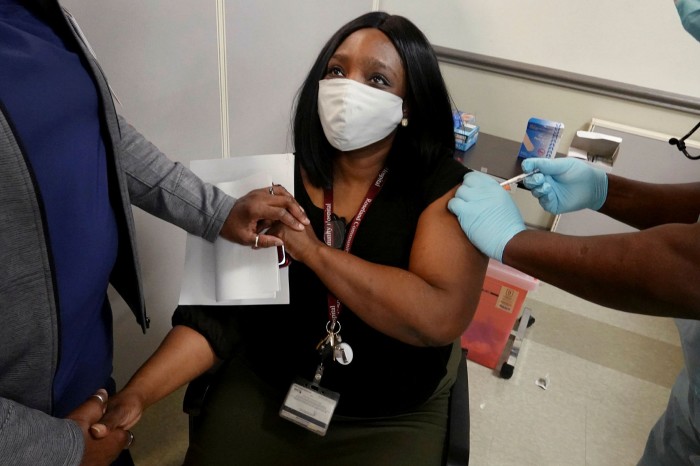
San Francisco plans to launch a $90m emergency rental assistance programme on Friday, designed to keep tenants hit hardest by the pandemic in their homes.
The programme would provide up to six months of rental assistance, including three months of future rent.
The most vulnerable tenants — such as those with past homelessness and extremely low household income — would be given priority, the mayor’s office said.
“This has been a year of challenges unlike anything we’ve faced before, and the economic fallout of the pandemic has been devastating for so many businesses and employees,” said London Breed, San Francisco mayor.
“It’s absolutely crucial that we keep people in their homes, and this funding will help ensure that happens,” she added.
Separately, Lori Lightfoot, mayor of Chicago, said the city would offer tenants nearly $80m in relief and up to 15 months of rental assistance and utility bill payment.
“Over the course of this incredibly difficult year, our residents, especially our most vulnerable ones, have faced unimaginable loss that is compounded by a systemic poverty and lack of access to safe, affordable housing,” Lightfoot said.
NYC test positivity rate hits eight-month low
New York City’s Covid-19 test positivity rate hit an eight-month low on Monday as neighbouring New Jersey moved to lift many pandemic-related restrictions.
Mayor Bill de Blasio said the 1.13 per cent rate was the lowest since September.
“This is really striking, Covid-19 is being run out of New York City because everyone’s going out and getting vaccinated, doing the right thing.”
He said nearly 8m jabs had been performed, with 70 per cent of senior citizens receiving at least one dose and 50 per cent of all adults fully vaccinated.
The mayor said the city’s economic and cultural recovery was accelerating.
The Late Show with Stephen Colbert, taped in New York, said it would resume with a live — vaccinated — audience at the Ed Sullivan Theater from June 14.
Across the Hudson river, New Jersey governor Phil Murphy said the state would lift its indoor mask mandate from Friday.
“The last two weeks have shown significant decreases in key areas of our data, including new cases, hospitalisations, spot positivity rates and rates of transmission,” he said.
“These data points, coupled with a dramatic increase in our vaccination efforts resulting in over 4.7m New Jerseyans with their first shot, allow us to lift major restrictions and move forward with our most significant reopening steps to date.”
Murphy said the mask mandate would continue at some institutions, such as aged care homes, child care centres, prisons and warehouses.
Switzerland to host first WHO BioHub
Switzerland and the World Health Organization said on Monday they plan to build the health body’s first distribution hub for the global sharing of viruses and other pathogens — such as the Sars-CoV-2 virus that causes Covid-19 — between laboratories globally.
The first WHO BioHub will be based in the Swiss town of Spiez, near Bern, to serve as a centre for the safe receipt, sequencing, storage and preparation of biological materials for distribution to other laboratories.
“Close international collaboration to ensure the timely sharing of epidemiological and clinical data as well as biological materials is of utmost importance,” Swiss federal councillor Alain Berset said as he opened the 74th World Health Assembly in Geneva.
“Switzerland supports the WHO BioHub initiative in its initial phase by providing the necessary infrastructure of a Swiss biosafety laboratory in Spiez,” he added. “With this, we hope to contribute to the establishment of an international exchange system for Sars-CoV-2 and other emerging pathogens.”
The WHO said most sharing of pathogens is done bilaterally between countries and on an ad hoc basis, which can be slow, and leave some countries without access to the benefits and tools.
“The Covid-19 pandemic and other outbreaks and epidemics have underscored the importance of rapidly sharing pathogens to help the global scientific community assess the risk and develop countermeasures such as diagnostics, therapeutics and vaccines,” said Tedros Adhanom Ghebreyesus, WHO director-general.
India police visit Twitter offices after row
Police in India have visited the local office of social media company Twitter, after its moderators labelled a tweet by the national spokesperson of the governing party as potentially misleading.
On May 18, Sambit Patra, national spokesperson of the Bharatiya Janata party, tweeted screenshots of a “toolkit”, or briefing notes, allegedly used by the Indian National Congress opposition party to discredit prime minister Narendra Modi and his government’s handling of the coronavirus pandemic.
The Congress party claimed the toolkit was fake and Twitter subsequently labelled the tweet as “manipulated media” on Thursday. The government then asked Twitter to remove the tag.
Read more here
Management lessons from the pandemic
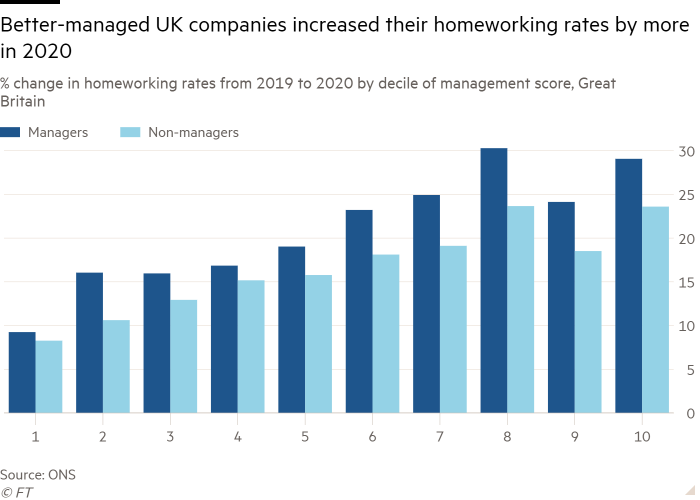
The UK’s Office for National Statistics found that well-managed companies adapted easier to remote working and the shift to operating online through judicious application of target-setting, performance reviews and training programmes.
The ONS report, which finds a significant relationship between management skills and labour productivity, echoes recent findings from the World Bank which found good human resource practices such as bonus and promotion schemes “reassure [staff] during a crisis that leaders will continue to reward high performance, and that they will not lay off workers”.
Nowhere is good management desperately needed right now than in tackling the thorny issue of whether workers need to return to the office. US bosses in particular, as Joshua Chaffin reports, are having trouble persuading workers to re-embrace the joys of the commute and join them back at HQ, despite attempts to lure them back with new facilities and the prospect of on-site services such as health and childcare.
Read more here
News you might have missed …
The number of visits to the UK by overseas residents fell dramatically last year, as coronavirus-induced restrictions dented the ability to travel. Data published on Monday by the Office for National Statistics showed that the number of visits to the UK declined by 73 per cent to 11.1m last year.
The US aviation regulator said it had received about 1,900 complaints of passengers refusing to wear face masks since the start of the year. The Federal Aviation Administration said it had received 2,500 reports of unruly behaviour, including 1,900 refusals to comply with the federal mask mandate.
The US has issued a “do not travel” advisory for Japan. The Level 4 travel advisory from the US Centers for Disease Control and Prevention and the state department, issued on Monday, comes as Japan’s government considers whether to extend a state of emergency in Tokyo and several other prefectures.
Students in New York City public schools are to be back in classrooms this autumn as Mayor Bill de Blasio calls time on remote learning in the largest US school district. In an interview on Monday, de Blasio said in-person teaching would return in September for 1m children in the system, with “no remote” learning.
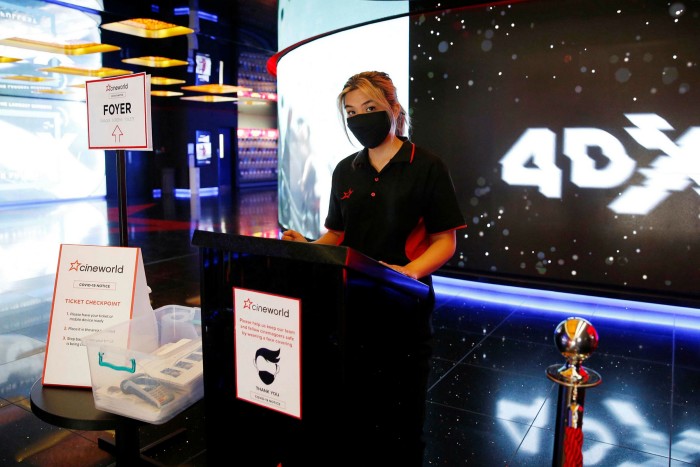
Cineworld said it enjoyed a strong opening weekend in the UK, with attendance figures expected to rise further as new films come out and more people receive a vaccine. The popularity of Peter Rabbit 2: The Runaway meant footfall across Cineworld’s UK venues “went beyond” expectations.
Another deal in a wave of US energy consolidation was announced on Monday, with shale oil producer Cimarex Energy and Cabot Oil & Gas revealing a $17bn“merger of equals”. The merger is the latest in recent months as the US oil patch recovers from last year’s pandemic-induced crude-price rout.
Accountant EY has told its UK staff they should expect to spend at least two days a week working from home after the pandemic, becoming the latest services firm to embrace hybrid working. The Big Four company’s 17,000 UK employees were informed they would split the rest of their time between offices and client sites.
Airbnb is moving to prevent a shortfall in rental properties, rolling out new tools including listing curation driven by artificial intelligence. With lockdown measures easing and travellers getting vaccinated, Airbnb faces a supply crunch in popular destinations, as an influx of guests risks outnumbering hosts.
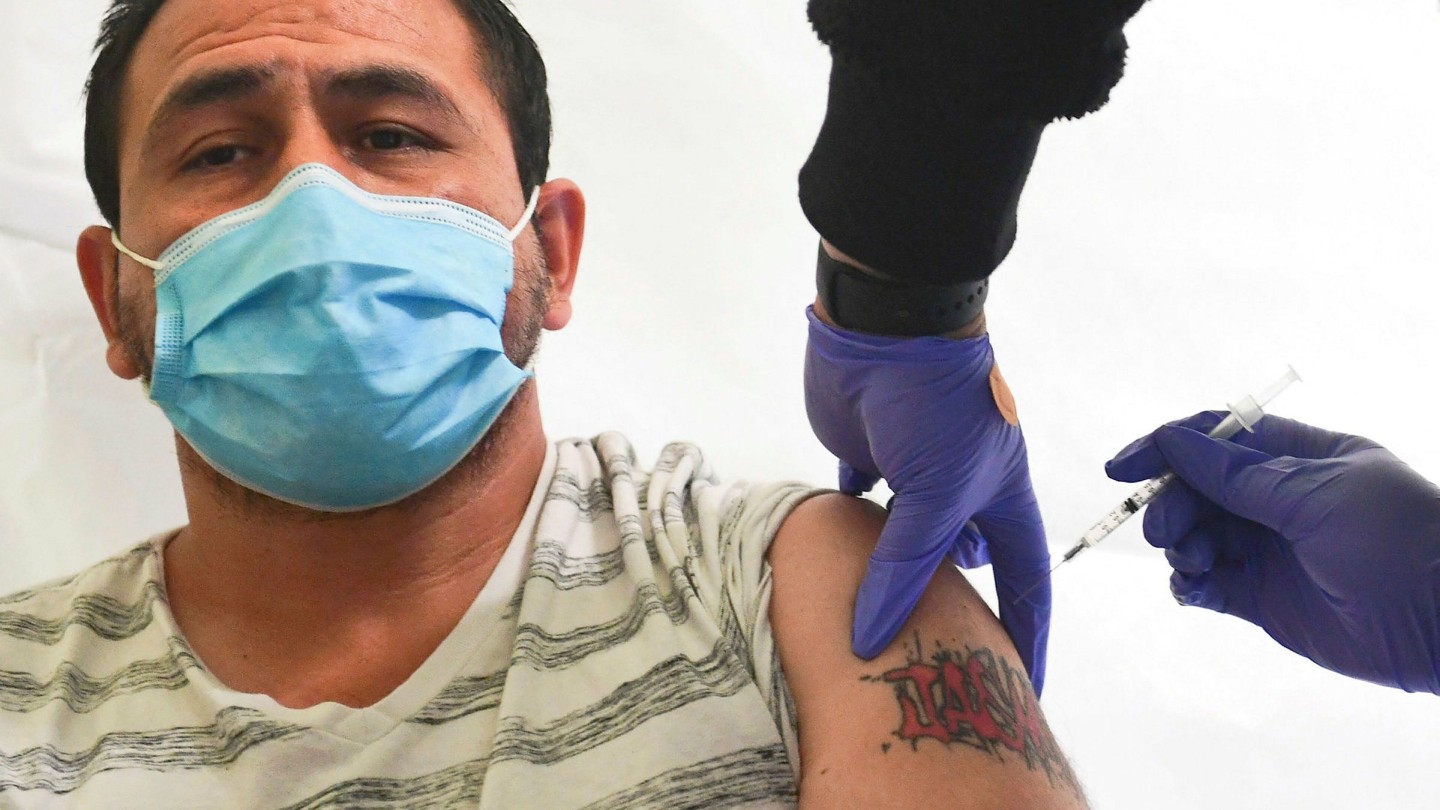
Comments